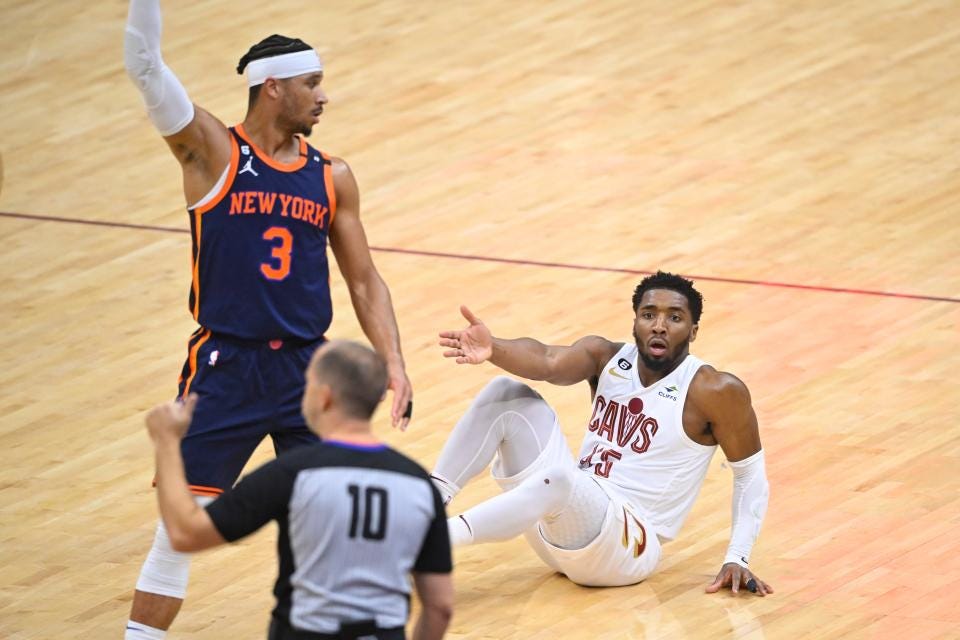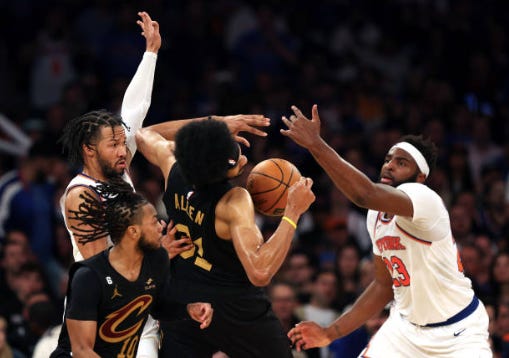Exits: The goal is the strain
The Cleveland Cavaliers could use some discomfort, and the shifting strains of family travel.
Not really realizing anything was wrong until my mom asks me on the sidewalk in front of the restaurant if I’m okay, then tearing up. Inside, my dad got up with some difficulty from the table and stood in the narrow aisle drinking his beer, then nearly walked backwards into one of the servers carrying a tray of steaming hoto noodle bowls and snapped at me for being bossy when I’d told him to be careful — for both their sakes. This dance of reconciling his decline with his intentions, and we’re both doing it badly.
The backdrop — a mountain lake and its lakeside resort town frozen in time, wild swans and the matching themed paddle boats in their image bobbing in the chop, banking herons, purple clumps of wisteria climbing over the tiled rooftops and taking over entire ancient cypresses on the hillside behind, the green wall of the hills on every side, and when the clouds it makes itself briefly clear, whipped by winds part of its own wether system, glimpses of Mount Fuji, imperious — somehow fitting. Distracting and fortifying.
It’s not about the restaurant, it’s all about the restaurant.
Out on the lake, in a small ferry boat ripping across the steely blue waves, I let my eyes water in the wind. Let a friendly woman from Oregon who offers to take my photo with Fuji hulking behind me take it. The mountain made smaller as soon as it gets snapped. I lean on the railing and try to bore it into my brain: the mountain, this feeling. Force memory and correct scale. The speakers mounted around the boat deck play a persistent drum beat for the 20-minute duration of the loop out onto Lake Kawaguchi and back, like the small samurai themed ferry is taking us to war instead of back to six soft serve shops along a short main street with maybe a dozen buildings. I feel at once intensely present and not at all there. Happy and amazed, sad and completely limited. The dualities of family, or family vacation.
Travel has its own frictions but it also has the tendency to smooth over the pain points of everyday life at home. Decisions determined by the day’s most basic components: where you’re going and weather, made more basic still by relying on the choices you’ve predetermined for yourself in packing, in picturing yourself at some imagined future in some other place. Those streamlined qualities grow even smoother in Japan.
If you’ve been, or know someone who has, then I’m sure you know or have heard plenty about how the roughest edges of life have been smoothed to a high shine of intuitive convenience. Even the act of travel becomes a streamlined blur. The trains are faster, get you most everywhere, run more reliably than clockwork, are more comfortable, quiet, roomy, feel more humanizing. The same goes for busses, planes, cabs and ferries. The same goes for most every human or non- interaction. Everything is orderly to the point where slight deviation (loud voices, untidy etiquette, holding things up) feels an affront to the senses as much as to polite society. Your comfort, and by extension yourself, are, at most junctures, considered; taken into account.
It’s not that teams don’t work without friction, or that small upsets should be constant (think of the Cavs conference rival, the Raptors, and how demoralized and palpably over it Toronto looked as their season stumbled to a close in the play-in; a season marred by internal disconnect and injury, one thing after the next), but watching Cleveland work so sunnily all throughout the regular season only to hit the first round and go slack, I was struck by the missing component, suddenly so clear — tension. There had been nothing so far to pull this team taut.
Jumping from finishing 13th to 4th under J.B. Bickerstaff over three years, going from no postseason in 2021, to not making it out of the play-in last season, to securing the 4th seed, this is linear growth. The trajectory wasn’t completely seamless, but from President Koby Altman and Bickerstaff’s joint decision to make a really big team onward, the steps have been in the same direction with an affable acquiesce that is one part midwestern good nature, and all other parts trades and smart development doing what they’re supposed to.
Even adding Donovan Mitchell felt like slipping on a forgotten, well-loved but still timeless shirt. His transition from the banks of a drying, alkaline lake to the fourth-largest of the North American freshwater Greats a relief compared to how his former teammate, Rudy Gobert, fared 200 miles south of Superior, struggling to connect with teammates and the better parts of the backboard. In Cleveland, Mitchell’s been automatic in feel, fit and as forerunner, knocking down the most points of his career while staying steady with assists.
This is a generous team. A team that brought back Ricky Rubio to keep a promise, that reunited Caris LeVert and Jarrett Allen, that rosters its star young talent’s (Evan Mobley) older brother (Isaiah Mobley), that sent veteran Kevin Love to sunnier climes not to snowbird, but to make an unexpected second act of soft retirement, and that has the, arguably, funnier Lopez brother. This whole roster is like slipping on a forgotten, well-loved but still timeless shirt, that also happens to be warm from the dryer. There is no friction, no guess of fit. It can be the best thing in basketball to watch a team that genuinely cares for each other look for and find one another on the floor, and to see how that care functions off the floor. It can also be — devoid of a ruthlessness sprung from pressurized tensity — the fastest way out of the game.
In Osaka, walking Dotonbori at night and eating a stick of strawberries coated in shells of hardened syrup, lights of the layered, teeming neons catching on the sheen of each glossy red fruit. The tray the woman selling them had handed me the stick from loaded with skewers — green grapes, tangerine segments, chunks of honeydew, giant and particularly perfect strawberries for 400 extra yen — and she waved her hand over them to motion, which one? The choice: limited, easy. The result: sweet, light, nothing to brace for.
An earthquake our second night in Tokyo. At 4am it’s our phones that wake us with a woman’s polite, lightly British inflection warning, EARTHQUAKE, EARTHQUAKE, EARTHQUAKE, STAY CALM. The bed starts to churn in circles, not a motion my brain has much experience with. Outside, I can see motorcycles and early-morning commuters cutting through the park compound surrounding the Zojo-ji shrine, unbothered. The next week, at a family hotpot dinner tucked in the farmland around Kochi, Ryoko’s sister, my new sister-in-law, will laugh and tell us she briefly woke up at her place in Tokyo and, sensing it was nothing, went back to sleep. But that must have been scary for you, she adds sincerely.
Altman said it after the team fell out, “We wanted it right now and that’s just not the journey that we’re on. We have to have a setback, and this was the setback and it’s going to help us get better.”
Still, there’s something in framing the need for a setback, for a strain to measure against, as planable that eases the brunt force of it — and it’s force the Cavs need to come up against. Not just once, not tidily or easily remedied, and not something to assign to part of the larger plan as if naming it, as Altman did, was coming out at the other end of it. But wholly and maybe badly, with full discomfort.
To be clear, the goal is not to accumulate setbacks. The goal is the strain. That little flick that comes after impatience, annoyance, upset, the realization that you might be stuck in a situation for longer than you’d like but, with no place to go, no easy exit, no mental check out, you settle into a state of abstracted resignation. A forced zen.
The Cavs had not been challenged, really, until the size and tenacity of the Knicks kept them, arms length, out of their on-court comfort zone. At any point of potential tension — driving to the paint, ratcheting up ball movement to give Mobley more shots — they deflected. That strain could have been enough to work with as an augmenter had Cleveland settled into and utilized it. Instead, the Cavs seemed surprised for four games straight. They did not confront discomfort nor did they adjust. Game after game of losing the same way and Cleveland didn’t settle into discomfort or let the strain of it turn them a different way.
Not to put too fine a point on it but most living organisms, to varying degrees of cellular complexity, alter behaviour when facing discomfort. Viruses mutate, apex predators organize, flight-driven animals respond with what they’re best at and run. The key difference in people is we get to decide where we’re going to direct the strain. No pain, no gain, in other words.
At the Yayoi Kusama museum, standing in an infinity room called I’m Here, but Nothing, and letting my eyes lose their focus in the dark on the glowing fluorescent dots painted over everything in the space, lit up by UV. The couch, double bed, desk and book cases, carpet and area rug, wall decor, all the walls, covered in phosphorescent polka dots.
I was at the same museum in 2019, and cried getting up to the third floor seeing the walls blanketed in her paintings. This time the exhibition’s showcasing her psychedelic work, or, work turned psychedelic because she made it in New York in the 1960s and 70s. Throbbing canvases patterned in lucid yellow, red, purple and greens, collage works dated as early as 1954 I’d never seen that remind me of Dorothy Hood, show posters from her 1967 Body Festival, where she painted dots all over people’s naked bodies in Washington Square Park.
Up through each of the museum’s five floors, repeated in most every piece’s caption or description, the theme of ego obliteration. Of letting go or forcibly removing the notion of self from your life, yourself. The theme, after nearly 14 days of wrestling with my place in so many close dynamics, bucking strain and feeling guilt and interrogating myself and my motives and impulses, is hard not to laugh at. Like most work I love, blunt or tender, I tend to find it when I need it most.
At breakfast in the ryokan, the fine porcelain cup slips from my fingers and tips onto its side on the table, spilling tea everywhere. The liquid steams and drips down onto the leather upholstered chairs, mimicking the condensation beading on every jarringly green leaf outside, where ribboned clouds wrap the hills stacked around us like the mountains are breathing.
Too relaxed, Dylan and I joke with our server, when he comes to help me mop it up.
This trip, in navigating language, new physical and mental realities, wants, roles, time, identity, has no steady state. The strains shift constantly. But for a minute, everything smooth, streamlined, down to the minor muscles made slack in my hands by the mountain water and 24 hours in the hotel-provided loungewear everyone dons and wears around, all resistance is gone.




Excellent as always. And, for me personally, aptly timed.
You’re always so good at weaving these tapestries, but this one came out especially seamless, especially beautiful. I think because in both of its threads, it locates time and space so well, the reader cannot ignore the atmosphere. Love reading your work, like always.